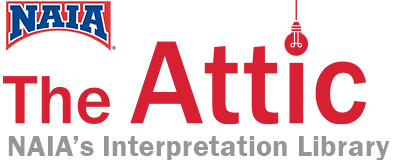Article VII, Section C: Recognized Awards Received By Students
The NAIA shall recognize the following award structure for awards directly resulting from place of finish or participation in athletics as conforming to the amateur regulations of this Association.
1. Individual awards presented to a student in recognition of intercollegiate athletics participation, or other athletic participation occurring during an academic term in which the student is identified with an NAIA member institution, shall be approved by the member institution and conference, if applicable, and shall conform to the following requirements:
a. All such awards must be of a personal nature (e.g. trophies, scholarship funds distributed in accordance with NAIA financial assistance rules, non-transferable clubhouse credits). Cash awards, cash equivalents or certificates redeemable for cash shall cause a student to lose amateur standing within the NAIA; and
b. A student may receive more than one award while being recognized (e.g. a first-place team trophy and an outstanding-performer watch), but the value of each individual award shall not exceed $1,000.00, nor shall the combined value of all such awards exceed $1,500.00.
2. An individual participating as a recognized amateur under the rules of a sport’s national governing body shall adhere to the amateur award regulations of the national governing body of that particular sport when the individual is not institutionally identified or when such events are held during the summer in which the individual is not representing an institution.
There are ways for a student-athlete to earn prize money for their athletic abilities that will not implicate their amateurism standing within the NAIA.
Activities Over the Summer (May 16 – July 31)
When not identified with an NAIA institution, such as the summer months, a student can earn cash prizes given directly to the student as long as the cash prizes do not violate the amateurism standing of the sport’s governing body. For instance, if an athlete wins a cash prize for competing in a golf tournament over the summer, and the earnings do not exceed what the PGA would consider to be professional-level earnings, then the student may accept the cash prize without violating his/her amateurism.
For further explaination, please see this article: https://interpretations.naia.org/summer-participation-amateurism/
Activities During the School Year (August 1 – May 15)
A student may compete in a competition and receive an award(s) during the academic year while identified with his or her NAIA institution, as long as all of the following guidelines are met.
- The NAIA institution (and conference, if applicable) must approve the award.
- The awards are of a personal nature, meaning tangible items such as trophies, medals, non-transferable clubhouse credit, scholarship funds distributed in accordance with NAIA financial assistance rules, etc. The awards CAN NOT be cash or a cash equivalent, such as gift cards.
- The award has a maximum dollar amount of $1000 for a single award. If multiple awards are received for the same competition the maximum for all awards is $1500. These are per event/competition limits.
The above rules are applicable for all student who are currently identified with their NAIA institution. However, these regulations no longer apply to students who are participating in competitions before NAIA identification, or during terms or summers when they are not identified with a NAIA institution.
“scholarship funds distributed in accordance with NAIA financial assistance rules”
During the academic year, if a student has the ability to earn cash winnings for a competition, they may accept the cash winnings under specific guidelines of NAIA amateurism. The bylaw allows for a student to receive scholarship funds distributed to their NAIA institution. This is common in the sport of bowling, for instance, and an athlete’s SMART funds (specific under USBC). A student who wins a bowling event has the ability for the event coordinators to deposit the money in the student’s SMART fund. The money, in turn, can then be deposited in the student’s NAIA financial aid account. In this manner, the money is never handed directly to the student and the award can be given as an “award of a personal nature”.
For other sports, similar actions can be taken by event coordinators where they can submit the cash winnings to the student’s NAIA financial aid account in the form of a scholarship or aid package. This must be in accordance with the student’s NAIA institution financial aid department policy. Also note the maximum amount a student may receive while identified with an NAIA institution. For one even, the student may win up to $1000. If there are multiple opportunities to win award money under one event, the award cannot exceed $1500.
Implications to Countable Aid Policy
There are implications to accepting awards via a scholarship package during the academic year. The Council of President’s policy on Institutional Financial Aid Policy states,
Countable aid is any and all financial assistance to student-athletes that is funded by the institution, controlled or allocated by the institution, regardless of category, title or original source. Countable aid includes institutional athletic grants or scholarships, academic scholarships, leadership and/or performance scholarships; outside scholarships administered by the institution; institutional benefits, room credits
,or meal credits; institutional loans and institutional work study, as defined in financial aid packages and that is funded by the institution; and reciprocal tuition waivers when waiver offers are decided on an student-by-student basis.
The important piece of note is that if an athlete’s winnings are deposited into the institution’s financial aid package, the act of the institution allocating the funds to the student automatically causes the money to become countable aid. All countable aid will be factored into the calculation of team’s financial aid limits per sport.
